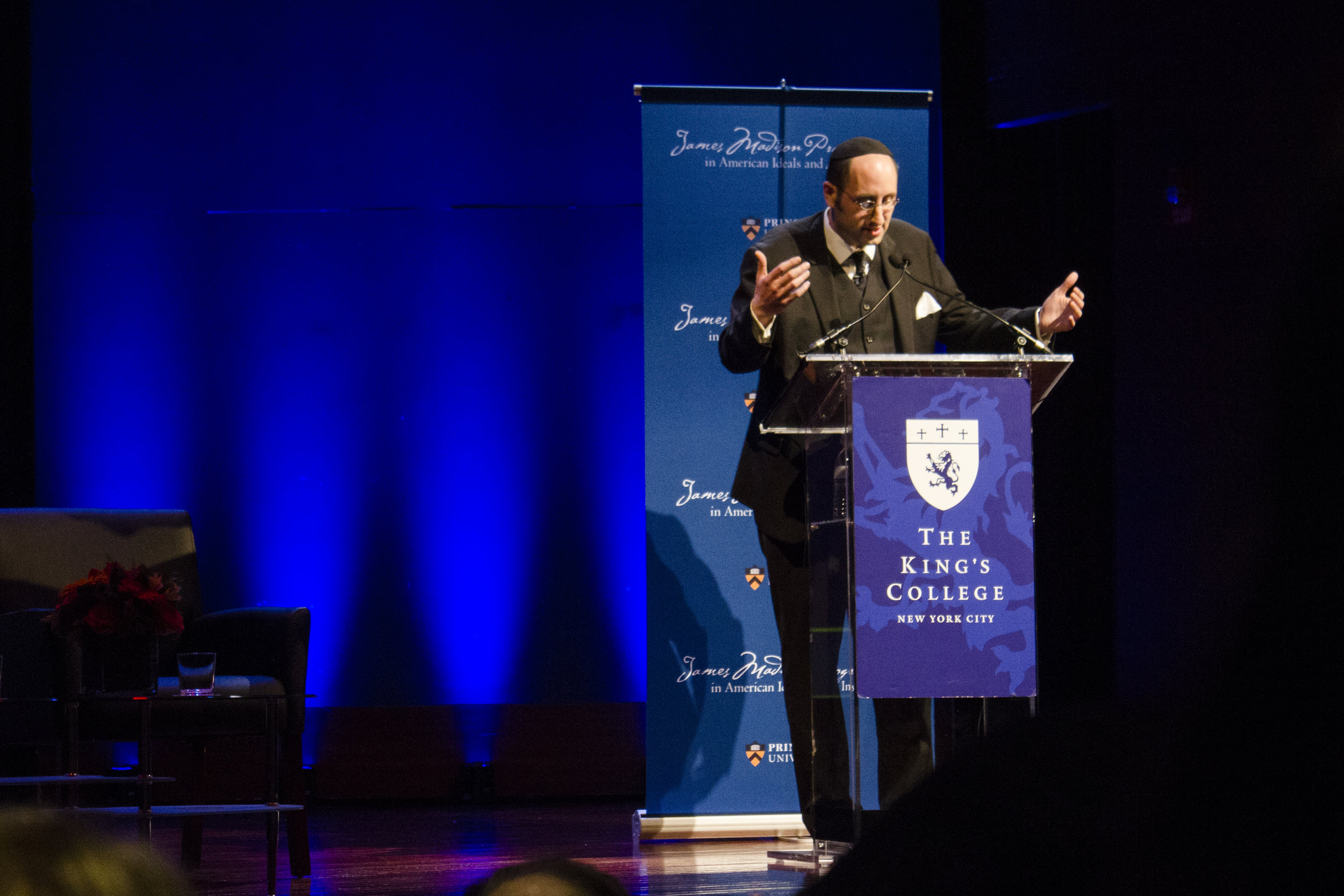Religious Freedom and Anti-Semitism: Is Europe Disconnected from Faith?
Left to Right: Robert P. George, J.D., PH. D., D.C.L. (host); Rabbi Dr. David G. Dalin; Professor Mary Ann Glendon; Rabbi Dr. Meir Y. Soloveichik | Photo by Bernadette Berdychowski
Acclaimed panelists came together on Nov. 6 at the Museum of Jewish Heritage to discuss how the Islamization of Europe and the rise of new secularism is resurrecting anti-Semitism in contemporary Europe today.
The Religious Freedom and Anti-Semitism in Contemporary Europe event was hosted by The King’s College and the James Madison Program in American Ideals and Institutions at Princeton University.
“You go to Mass on Sunday and I play golf. It’s a hobby,” Professor Mary Ann Glendon, a Learned Hand professor of Law at Harvard University and former U.S. Ambassador to the Holy See, said her friend told her once.
According to Glendon’s observations, religious indifference is a factor that causes Europeans to disregard religious freedom as an important right. She even mentioned that she struggled to convince people that religious freedom was a right worth protecting.
The panelists agreed that the Islamization of Europe has also heightened tensions. This is a large concern for European governments.
“The threat of religiously motivated violence is the most frequently known justification for new laws restricting religious freedom,” Glendon said.
Glendon argues that new secularism views religion as an ill of society, which endangers religious freedom.
“They can’t pass a law singling out a particular group, so they pass a general law that treads on the religious freedom of everybody,” Glendon said.
“Anti-Semitism is not a hatred of difference, it is a hatred of Jews.”
In support of Glendon’s argument, Rabbi Dr. David G. Dalin, professor emeritus at Ave Maria University, gave specific examples of anti-Semitic legislative movements.
“Political activists, especially on the secular left, have publicly advocated outlawing Jewish religious circumcision.” Dalin said.
Not only is religious circumcision being advocated to be outlawed, but in 2014, Denmark passed a law banning kosher slaughter.
Dalin also expressed how the governments of Europe’s response is unsatisfactory for many Jews. To make his point, Dalin referenced a case where European Jews were discouraged by their governments from wearing religious symbols in public.
In another case, Dalin discussed how a German court ruled that a synagogue firebombed by three Palestinians in 2014 wasn’t an act of anti-Semitism.
“By this court ruling, the German legal system essentially affirmed that German synagogues are legitimate targets for violent attacks by Muslims who may be angry with Israel, and such attacks should not be considered anti-Semitic but rather an understandable form of political protest,” Dalin said.
Rabbi Dr. Meir Y. Soloveichik | Photo by Bernadette Berdychowski
While Glendon and Dalin attribute the growing Islamization and secularism to the rise of anti-Semitism, Rabbi Dr. Meir Y Soloveichik, director of the Zahava and Moshael Straus Center for Torah and Western Thought at Yeshiva University, considered that the deep roots of anti-Semitism lie in the hearts of people.
“Anti-Semitism is not a hatred of difference, it is a hatred of Jews,” Soloveichik stated.
He argued that the Jewish people are a remarkable and miraculous group of people, and that to be Jewish is to be eternal.
“For each country sought to replace Israel and declare itself as God’s own chosen nation,” Soloveichik said.
According to Soloveichik, nations can resist anti-Semitism by embracing their religious roots, something Glendon mentioned as well.
“For each country sought to replace Israel and declare itself as God’s own chosen nation,”
Soloveichik used the United States as an example. The founders of the country were not “envious” of the Hebrews, but “entranced” by their literature and moral code. America saw the Jewish people for what they were: remarkable and miraculous.
Lincoln called America an “almost chosen nation.”
Soloveichik thinks this title is befitting.
“America is not a biblically chosen placement, but it is its imitator,” Soloveichik stated. “The state of every society can be filed in its ability to recognize or to ignore and attack miracles such as these [the Jewish people].”
Left to Right: Robert P. George, J.D., PH. D., D.C.L. (host); Rabbi Dr. David G. Dalin; Professor Mary Ann Glendon; Rabbi Dr. Meir Y. Soloveichik | Photo by Bernadette Berdychowski
Both Soloveichik and Glendon recognize that America embraces their Judeo-Christian origins, but the Western countries of Europe are trying to sever their history with Judeo-Christianity.
“They’re worried Europe is losing her moral compass,” Glendon said. “They’re worried that Europeans are increasingly unable to say what principles they will defend and why they will defend them.”
To Glendon, then, synergy between Jerusalem and Athens appear to be fading.
“Europe itself has entered post-Enlightenment age and has given up, certainly on Jerusalem, and maybe on Athens itself,” Soloveichik agreed.
Through the points made during the Religious Freedom and Anti-Semitism in Contemporary Europe discussion, new secularism is coinciding with the Islamization of Europe and the panelists agree that through this dangerous combination, if not addressed, serious issues will arise.



